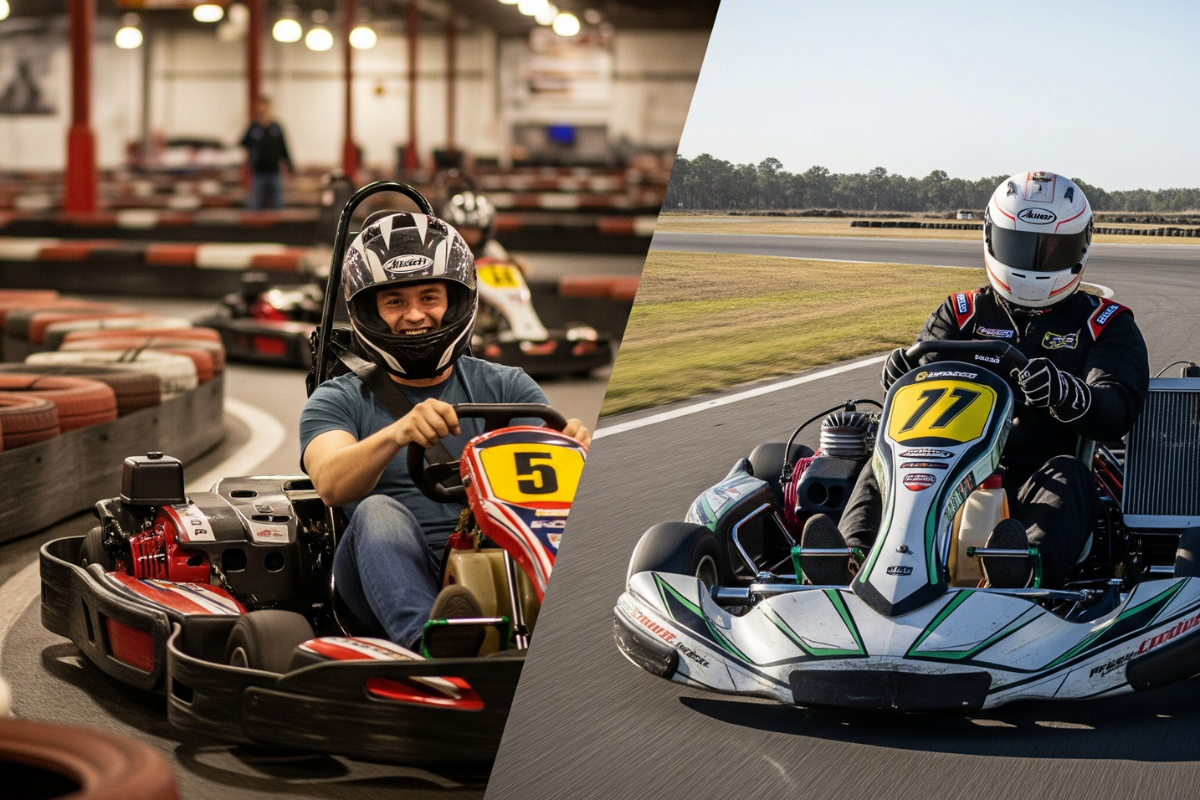Go-karting is more than just a fun weekend activity; it’s a gateway into the thrilling world of motorsports. For many, the adrenaline rush and competitive spirit ignited on a go-kart track can evolve into a lifelong passion, transforming from a casual hobby to a serious pursuit, and even a professional career. This comprehensive guide explores the different stages of this journey, providing insights and advice for anyone looking to deepen their involvement in go-karting, whether for personal enjoyment or professional ambition.
The Spark: Go-Karting as a Hobby
For most, the initial encounter with go-karting is purely recreational. It’s an opportunity to experience speed, challenge friends, and enjoy the thrill of the race without the intense pressures of competition. This stage is crucial as it lays the foundation for any future aspirations.
The Fun Factor and Skill Development
At the hobbyist level, the primary focus is on enjoyment. It’s about the exhilaration of driving, the camaraderie with fellow enthusiasts, and the personal challenge of improving lap times. However, even at this stage, fundamental skills are being developed. Drivers learn about braking points, cornering techniques, and race etiquette. Each session on the track contributes to a better understanding of vehicle dynamics and driver control. This informal learning is invaluable, providing a practical foundation that classroom instruction alone cannot replicate. The sheer joy of driving and the satisfaction of personal improvement are key motivators at this stage.
Finding Your Local Track and Community
The first step in pursuing go-karting as a hobby is to find a local track. These facilities often offer arrive-and-drive sessions, allowing newcomers to experience the sport without owning their equipment. Engaging with the local go-karting community is also essential. Connecting with experienced hobbyists and track staff can provide valuable advice on driving techniques, track conditions, and potential opportunities for more involved participation. Many tracks also host informal races or practice days that offer a taste of competition in a relaxed environment. This sense of community can greatly enhance the enjoyment of the hobby and provide a supportive network for future development.
Investing in Your Own Equipment (Optional)
As the passion for go-karting grows, some hobbyists may choose to invest in their own equipment. Owning a kart, even a basic one, allows for more frequent track time and the ability to customize the setup to personal preferences. This step signifies a deeper commitment to the hobby and opens doors to more advanced levels of participation, such as club races or organized practice sessions. The maintenance and tuning of your own kart also adds another dimension to the hobby, fostering a deeper understanding of the mechanics involved. However, owning equipment is not a prerequisite for enjoying go-karting as a hobby; many continue to rent karts and actively participate in the community.
Stepping Up: Competitive Go-Karting at an Amateur Level
For those whose passion transcends casual lapping, amateur-level competitive go-karting offers a more structured and challenging environment. This is where the transition from hobbyist to serious enthusiast begins.
Joining a Local Karting Club
The first significant step into competitive go-karting is joining a local karting club. These clubs organize regular race events, provide a platform for honing racing skills against other motivated drivers, and often offer training and mentorship opportunities. Participating in club races introduces drivers to the nuances of competitive racing, such as race starts, overtaking maneuvers, and defending positions. The structured format of these events, with qualifying sessions and multiple race heats, provides valuable experience in a competitive setting. Furthermore, being part of a club fosters a strong sense of camaraderie and provides a network of like-minded individuals who can offer support and advice.
Acquiring the Right Equipment and Gear
Competitive go-karting demands appropriate equipment and safety gear. This typically includes a racing kart that meets the regulations of the specific class you intend to compete in, a racing suit, helmet, gloves, and supportive footwear. Investing in quality equipment is crucial not only for performance but also for safety. Understanding the different classes and the technical specifications for each is important when selecting a kart. Additionally, learning about kart maintenance and setup is essential for maximizing performance and ensuring reliability on race day. This stage often involves a significant financial investment and a commitment to learning the technical aspects of go-karting.
Developing Advanced Driving Techniques and Racecraft
Success in amateur racing requires more than just speed; it demands advanced driving techniques and racecraft. This includes mastering precise braking, optimizing cornering lines for maximum speed and momentum, and developing strategic skills for overtaking and defending. Learning to read track conditions and adapt driving styles accordingly is also crucial. Many aspiring racers at this level seek coaching from experienced drivers or karting instructors to refine their skills and gain a competitive edge. Analyzing race footage and practicing specific maneuvers are also important aspects of development at this stage.
The Importance of Consistency and Dedication
Progress in competitive go-karting hinges on consistency and dedication. Regular practice, both on and off the track (such as physical fitness training), is essential for improving performance. Analyzing race data, studying track layouts, and constantly seeking ways to improve are hallmarks of dedicated amateur racers. The mental aspect of racing, including focus, composure under pressure, and strategic thinking, also requires cultivation. This level of commitment marks a significant step beyond casual hobby go-karting and lays the groundwork for potential professional pursuits.
The Professional Path: Making Go-Karting a Career
For a select few, the passion and dedication to go-karting can lead to a professional career in motorsports. This path is demanding, requiring exceptional talent, unwavering commitment, significant financial backing, and a considerable amount of luck.
Demonstrating Exceptional Talent and Race Results
The first crucial step towards a professional career is consistently demonstrating exceptional talent and achieving significant race results at the amateur level. Winning regional and national championships, setting track records, and showcasing a high level of skill and racecraft are essential for attracting attention from racing teams and sponsors. Professional scouts and team managers often attend major amateur karting events, looking for promising young talents. Therefore, performing consistently well and standing out from the competition is paramount.
Securing Sponsorship and Financial Support
A professional racing career is often heavily reliant on sponsorship and financial support. The costs associated with racing at higher levels, including equipment, travel, team fees, and testing, can be substantial. Developing strong communication and networking skills to attract sponsors is crucial. This involves creating compelling proposals that highlight the potential return on investment for sponsors, building relationships with businesses and individuals, and effectively representing their brands. Demonstrating professionalism both on and off the track is essential for securing and maintaining sponsorships.
Moving Through the Racing Ladder
The path to professional motorsports typically involves progressing through a well-defined racing ladder. For go-karting professionals, this often means moving from national-level karting to junior racing series in formula cars or touring cars. Success at each step of the ladder is crucial for gaining experience, building a racing resume, and attracting opportunities at higher levels. Each series presents new challenges, faster cars, and more experienced competitors, requiring constant adaptation and improvement. The ability to learn quickly and perform under increasing pressure is vital for upward mobility in the racing world.
The Physical and Mental Demands of Professional Racing
Professional racing is incredibly physically and mentally demanding. Drivers need to be in peak physical condition to withstand the G-forces and sustained concentration required during races. Rigorous training regimes, including cardiovascular fitness, strength training, and reaction time exercises, are essential. The mental aspect is equally important, requiring focus, resilience, strategic thinking, and the ability to perform under intense pressure. Professional drivers often work with trainers and sports psychologists to optimize their physical and mental performance.
The Unpredictable Nature of a Racing Career
It’s important to acknowledge that even with talent and dedication, a career in professional motorsports is highly unpredictable. Factors beyond a driver’s control, such as team dynamics, equipment reliability, and luck, can significantly impact their progress. Perseverance, adaptability, and a strong support network are crucial for navigating the challenges and uncertainties of a professional racing career. Many talented drivers face setbacks and disappointments along the way, making resilience and a strong mental fortitude essential for long-term success.
Embracing the Journey
Whether you’re content with the exhilaration of weekend lapping or dream of standing on a professional podium, the journey of transforming your go-karting involvement is a personal one. What begins as a fun hobby can evolve into a passionate pursuit, offering opportunities for skill development, competition, and personal growth. For the few who possess the talent, dedication, and resources, a professional career in motorsports is a challenging but potentially rewarding path. Regardless of your aspirations, the thrill of driving a go-kart and the camaraderie of the racing community offer a unique and enriching experience. So, embrace the journey, enjoy the ride, and see where the passion for karting takes you.

Ramon Splinter is a passionate go-kart enthusiast and expert who shares valuable tips and insights on Zyorb, a blog dedicated to karting enthusiasts. With years of experience on the track, he specializes in helping beginners and seasoned drivers improve their skills, optimize their karts, and master racing strategies. His articles combine technical knowledge with practical advice, making go-karting more accessible and exciting for all.

